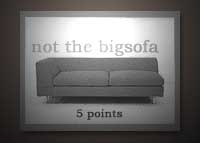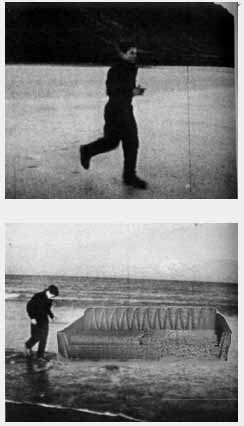
400 Blows
Directed by
Francois Truffaut
Original story
Francois Truffaut
Adaptation and dialogue
Marcel Moussy
Music by
Jean Constantin
Director of Photography
Henri Decae
Film Editing by
Marie-Josephe Yoyotte
Set Decoration by
Bernard Evein
return to bigsofa cinema main
|
|
400 BLows
Directed by Francois Truffaut
Antoine Doinel--Jean-Pierre Leaud
Gilberte Doinel--Claire Maurier
Julien Doinel--Albert Remy
"Little Quiz"--Guy Decombie
M. Bigey, Rene's father--Georges Flamant
Rene--Patrick Auffay
Released 1959
Rates as a must see
BigSofa's role in the film "400 Blows" is not an easy one to analyze. The following are the final images and text presented in the filmscript of "The 400 Blows" published by Grover Press, Inc. New York in 1969.


The film is succinctly summed up by Grover Press on the back cover. Its story concerns, "...the revolt of a twelve-year-old Parisian schoolboy against unfeeling parents and a dull school, his passage into delinquency, and his escape from confinement into a perilous freedom."
In case one can't read the text on the page, it says,
The camera tracks back with him. The tide is out and the beach is long and flat. He is alone. He reaches the surf and walks into the water, it circles around his shoes and he looks down, surprised.
A big gold sofa has ridden in on the surf.
The boy sits on the sofa a moment. Then he stands, turns, and walks in the water parralel to the beach.
Taking a look over his shoulder at the sofa, he turns back to the shore. A whirlpool forms and lifts the sofa up and away in to the sky as the camera approaches Antoine and the shot freezes into a still.
The sofa reappears in Antoine's life every seven years but he never sits on it again.
400 Blows is reported to be a largely autobiographical work. As an autobiography, the epilogue statement is a supposition, for though Antoine/Truffaut may not have sat on the sofa again up to that time, we do not know about that period subsequent the film's release.
It is curious to note Truffaut's interest in UFO's, as evidenced by his appearance as the character Claude Lacombe (based on Jacques Vallee) in Spielberg's "Close Encounters of the Third Kind". It is our belief that the sofa here served, unconsciously or not we can't know, as a metaphor for close contact experience which Antoine is given as having run to meet, which gave him the opportunity or courage to embark on a course of freedom apart from the human lemmings he has been surrounded by, but which must have also given him a good fright.
His feelings toward the sofa are obviously ambiguous. He sits upon it, then he gets up from it. He doesn't know whether he wants to remain upon it or not. Then he turns to see the sofa being spirited away on a whirlpool/tornado (the tornado is commonly used as a device in conjunction with unidentified flying objects).
What would have happened had he been sitting on the sofa when it took off?
Remember, in the film, "Close Encounters", at the end we have a UFO appearing and out of it stream individuals who had been previously abducted. Had Antoine remained upon the sofa, would he have been one of the souls to return in "Close Encounters"? Or perhaps he (Antoine/Truffaut) was on the sofa (ufo) when it took off, which is inferred by Antoine sitting on the sofa at all. It is a moment of transition given here as being almost instantaneous. Antoine sits on the sofa and then gets up. He is caught up in the ufo and then is not. He turns to watch the sofa whirl away, but the shot freezes on the scene, which suggests that the ufo/sofa never really left his life at all. As a prevailing influence, it remained with him.
Copyright © 2000 Idyllopus

|
| |

